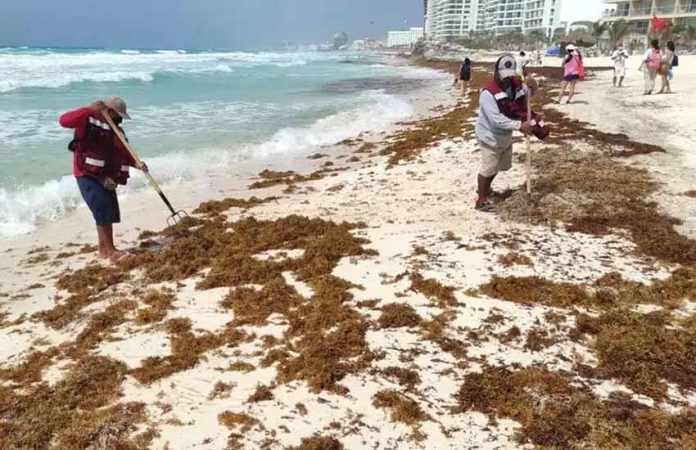A National Autonomous University (UNAM) scientist has warned that rotting sargassum can pose a risk to human health.
Huge quantities of sargassum – a seaweed that emits a foul odor when it decomposes – have washed up on Quintana Roo beaches this year. Twenty-two beaches in the Caribbean coast state were covered with excessive quantities of the weed on Tuesday, according to the Quintana Roo Sargassum Monitoring Network, while 21 were plagued by abundant amounts.
When large quantities of sargassum decompose, gases such as hydrogen sulfide – which has a rotten egg smell – methane and ammonium are generated, said Brigitta Van Tussenbroek, a researcher at UNAM’s reef systems unit in Puerto Morelos.
“The one of greatest concern is hydrogen sulfide,” she said, explaining that chronic exposure to the gas can cause health problems, “mainly for people who have respiratory problems.”
According to the United States Agency for Toxic Substances and Disease Registry (ATSDR), “just a few breaths of air containing high levels of hydrogen sulfide can cause death.”
“… Exposure to low concentrations of hydrogen sulfide may cause irritation to the eyes, nose, or throat. It may also cause difficulty in breathing for some asthmatics,” the ATSDR said. “… Exposure to low concentrations … may cause headaches, poor memory, tiredness, and balance problems,” it added.
Those most at risk of health problems are people employed to remove sargassum from beaches. The federal Environment Ministry last year published guidelines for sargassum collectors, but they are not legally binding and consequently not adhered to all of the time, Milenio reported. Sargaceros, as such collectors are known, are supposed to wear gloves, boots and face masks when removing the seaweed from beaches, but they don’t always follow that advice, the newspaper said.
Enforceable regulations are needed, said Van Tussenbroek, adding that sensors that measure hydrogen sulfide levels could also help protect sargassum shovelers.
With reports from Milenio
